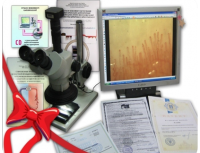Vascular Screening Technology

We are sure that any doctor’s workplace should be equipped with a capillaroscope!
Within a few minutes communicating with a patient, a doctor receives vascular status and is able to differentiate in screening mode any vascular pathogenesis of the existing nosology. The physician should personally monitor the process for the successful outcome of the treatment.
The capillaroscope on your desktop enables you to watch the life of blood vessels non-invasively and quickly and make an effective decision in time.
We conduct courses on capillaroscopy
Many diseases have their specific patterns depending on the injured organ and the stage of the disease development, so currently capillaroscopy and vascular screening is a tool of evidence-based medicine for monitoring and treatment in the following specializations:
Rheumatology – diagnostics of vascular pathology from Raynaud’s syndrome to gross lesions and destruction of the microcirculatory bed. Vascular screening determines the density of capillaries, their size, structural anomalies and the presence of hemorrhage.
Therapy – pathology of the heart and lungs, liver and kidneys depends directly on the state of blood supply. Today, venous congestion in these organs can be identified and monitored in the treatment of pneumonia, cardiac pathology, liver and kidney failure.
Cardiology / Cardiac surgery – doctors have the opportunity to perform a diagnostic check-up of the smallest element of the cardiovascular system – the capillary for timely diagnosis and development of effective treatment systems and preventive measures without surgery, and, if necessary, for cardiac surgery – to quickly evaluate the effectiveness of surgery already performed during the surgery.
Neurology – blood supply to the cerebral cortex depends directly on the state of microcirculation, it is capillaroscopy that enables you to see the problems of blood supply and to design them for cortical and brain deficiency.
Pulmonology – capillaroscopy enables to diagnose venous congestion in the lungs, to identify them it is possible to identify risks of developing acute and chronic pneumonia, bronchitis, bronchial asthma, to monitor the treatment process, minimizing venous congestion.
Oncology – capillaroscopy enables to diagnose cancer at an early stage. It is an effective method of monitoring the patient’s condition and the course of the disease at different stages of oncopathology. Pathological neoangiogenesis is the basis of tumor development. The timely detection of uncontrolled hypervascularization can significantly improve the patient’s condition. Capillaroscopy can objectify specific patterns of oncocapillaries as a variant of precancerous or cancerous lesions of certain organs.
Endocrinology – capillaroscopy can visualize specific patterns in thyroid pathology, pathological rearrangement against the background of menopausal disorders, observe the system of dysfunction of the corresponding glands and differentiate the pituitary intersystem disorders from the actual local disorders of the endocrine organs.
Vascular surgery – capillaroscopy is the evidence base for the surgeon to confirm the need for surgery and to confirm the effectiveness of the operation. Capillaroscopy displays the depth of peripheral artery or vein damage and allows the physician to personally monitor the process and observe the changes.
Proctology – systemic lesions of the venous channel throughout the body, the doctor will be able to see by capillaroscopy, as well as diagnose patterns of oncocapillaries, which can give additional confirmation by 80% if the doctor suggests rectal cancer.
Andrology – men’s health is directly dependent on the blood supply. Erectile dysfunction, impotence, infertility – 70% depends on the vascular factor and the speed of vascular reorganization. It is capillaroscopy that will show your blood supply deficit and help you make an effective decision on time and quickly.
Gynecology / Obstetrics – endometriosis, infertility, fibroids have specific patterns of vascular screening. The presence of venous stagnation in the pelvic organs, showing capillaroscopy, requires personalized treatment and the need for monitoring by vascular screening. Therefore, this kind of non-invasive diagnosis makes it possible to prescribe effective treatment and monitor the process.
Neonatology – congenital microvascular pathology, perinatal encephalopathy, hydrocyphalus, chronic cerebral edema, and general blood supply deficits can be verified by vascular screening and help the physician timely select treatment for long-term irreversible brain changes. Neurosonography is a statement of fact that a problem is present, and Vascular screening is a tool for healing and tactics.
Paediatrics – a doctor’s desktop tool for identifying the health of a child who cannot voice their complaints and feelings. This is a hint of a baby’s somatic condition for hypotension, venous stagnation, chronic tissue swelling and risk of bleeding. Vascular screening is as a mirror for the clinician.
Gerontology – vascular screening is a necessary primary diagnosis for the elderly, who assesses the background and reserve capabilities, the state of neglect. In a few minutes the doctor will be able to identify the risk factor and choose the optimal treatment strategy: home, regular pay or resuscitation.
Sale of equipment
The program can generate clinical conclusions in 4 languages: Ukrainian, English, Russian, Arabic. More…
Technological support
IT support is comprehensive support for users of Vascular Screening Technology.
Includes:
- setting up a working place for VST
- after the acquisition and functioning of the technology we provide online questions and answers support within a month
- “electronic” support for interpretation of the received images when necessary
- warranty service
- post-warranty service




